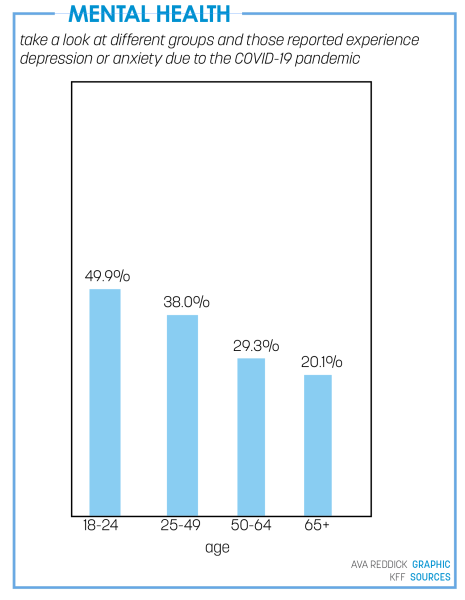Four years since the beginning of the Covid-19 pandemic, students are back at school and have resumed their normal routines. However, lingering effects from isolation remain for some students like sophomore Cardea Hoang. For her, the long periods of quarantine created a strain on her past relationships. Despite that, Hoang said it was easier to build new friendships after the pandemic due to the maturity she gained during quarantine.
“The relationships I made before the pandemic definitely became a lot weaker, but the ones I formed after having more knowledge about creating friendships have been really strong,” she said.
Like Hoang, sophomore Anjali Prasad said she felt the same. She said the pandemic encouraged her to open up and talk to people she didn’t normally speak to.
“I feel that the pandemic has almost encouraged me to make friends and reach out to more people because during the pandemic it was a little lonely,” she said. “I just saw my immediate family every day and I didn’t talk to my friends that much. It just encouraged me to reach out to people.”
Both students said isolation made them realize friendship is important. Although they said being separated from friends for a long time was harsh, it gave them the opportunity to reflect and figure out what was important in their lives. However, since the pandemic occurred at a critical period in their lives, Hoang and Prasad said there were negative effects to deal with as well. For example, although the pandemic improved her friendship-building skills, Hoang said she lost touch with people as well.
“During (the pandemic), people changed. And especially when you’re isolated you diverge more than you normally would. So after I went back a lot of my friends just weren’t friends with me anymore,” she said.
Hoang and Prasad are not alone in this sentiment. According to the American Perspectives Survey, Americans report having fewer close friendships than they once did since the pandemic began. One contributing factor may have been missing out on important developmental periods in their lives.
Hoang said, “I missed seventh grade. I feel like seventh grade is a pivotal moment in every student’s life because you develop yourself in so many different ways. And not being around people during that time can definitely affect you.”
Counselor Emily Clark said she was concerned for students returning from the pandemic and their ability to cope with the sudden return to a regular schedule. She said she sees the long-term effects.
 “The academic gaps, the motivation gaps, the anxiety that came from it and the heartache. A lot of people lost a lot of people that they loved,” she said.
“The academic gaps, the motivation gaps, the anxiety that came from it and the heartache. A lot of people lost a lot of people that they loved,” she said.
Despite the bleak statistics on young adult mental health, there are ways to improve one’s well-being. Taking the first step in getting to know people is essential to rebuilding social networks. For both Hoang and Prasad, friends were crucial during recovery.
For Prasad, starting conversations with people she wouldn’t normally talk to was key. She said simply waving or saying hello to several people after coming back from quarantine opened the door to gaining new friends. To her, maintaining solid friendships is as important as creating them. Prasad said keeping in touch with other people is pivotal to preserve connections with them.
“Definitely reach out to your friends, text them, and just talk to them more because if another pandemic were to happen, you’d definitely miss them,” she said. “You’d miss talking to them every day, so just reach out to your friends.”
According to the National Institutes of Health, friendships are incredibly important to well-being and are a critical part of mental development. Hoang said new relationships were what changed her as a person. She was able to improve herself with the support her friends provided.
“My new friends have helped so much and I can’t thank them enough for it,” she said.
Newfound friendships are not the only way to deal with post-pandemic challenges. According to Clark, the journey is not easy, but there are abundant resources to help students recover at this school. She said the counseling department can help with both academic and social struggles.
“At a school the size of Carmel, we have so many resources and so many people that care about you and your education and you as a human,” she said. “If you can utilize leaning on someone when you need help, then it’s going to be there for you.”
As time goes on, students like Hoang and Prasad said they are making the best of their new normal and using their newfound maturity to push themselves to grow as people. Ultimately, Hoang said to not lose hope for the future.
“It gets better eventually,” she said, “You might not think it will, but it will. And it might be tomorrow, in a week, in a month, but it’ll get better. I promise.”
















































































![Review: “The Immortal Soul Salvage Yard:” A criminally underrated poetry collection [MUSE]](https://hilite.org/wp-content/uploads/2025/03/71cju6TvqmL._AC_UF10001000_QL80_.jpg)
![Review: "Dog Man" is Unapologetically Chaotic [MUSE]](https://hilite.org/wp-content/uploads/2025/03/dogman-1200x700.jpg)
![Review: "Ne Zha 2": The WeChat family reunion I didn’t know I needed [MUSE]](https://hilite.org/wp-content/uploads/2025/03/unnamed-4.png)
![Review in Print: Maripaz Villar brings a delightfully unique style to the world of WEBTOON [MUSE]](https://hilite.org/wp-content/uploads/2023/12/maripazcover-1200x960.jpg)
![Review: “The Sword of Kaigen” is a masterpiece [MUSE]](https://hilite.org/wp-content/uploads/2023/11/Screenshot-2023-11-26-201051.png)
![Review: Gateron Oil Kings, great linear switches, okay price [MUSE]](https://hilite.org/wp-content/uploads/2023/11/Screenshot-2023-11-26-200553.png)
![Review: “A Haunting in Venice” is a significant improvement from other Agatha Christie adaptations [MUSE]](https://hilite.org/wp-content/uploads/2023/11/e7ee2938a6d422669771bce6d8088521.jpg)
![Review: A Thanksgiving story from elementary school, still just as interesting [MUSE]](https://hilite.org/wp-content/uploads/2023/11/Screenshot-2023-11-26-195514-987x1200.png)
![Review: "When I Fly Towards You", cute, uplifting youth drama [MUSE]](https://hilite.org/wp-content/uploads/2023/09/When-I-Fly-Towards-You-Chinese-drama.png)
![Postcards from Muse: Hawaii Travel Diary [MUSE]](https://hilite.org/wp-content/uploads/2023/09/My-project-1-1200x1200.jpg)
![Review: "Ladybug & Cat Noir: The Movie," departure from original show [MUSE]](https://hilite.org/wp-content/uploads/2023/09/Ladybug__Cat_Noir_-_The_Movie_poster.jpg)
![Review in Print: "Hidden Love" is the cute, uplifting drama everyone needs [MUSE]](https://hilite.org/wp-content/uploads/2023/09/hiddenlovecover-e1693597208225-1030x1200.png)
![Review in Print: "Heartstopper" is the heartwarming queer romance we all need [MUSE]](https://hilite.org/wp-content/uploads/2023/08/museheartstoppercover-1200x654.png)




